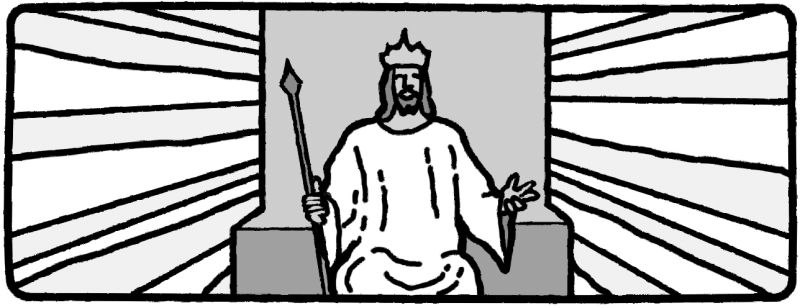Read Psalm 19:7; Psalm 93:5; Psalm 119:165; Psalm 1:2, 6; Psalm 18:30; and Psalm 25:10. What common thread runs through them all?
The Lord’s supremacy in the world as the Sovereign Creator, King, and Judge has theological implications for the reliability of His testimonies. The testimonies (Hebrew ‘edut, “decree,” “law”) refer to the body of laws and ordinances with which the Lord governs the religious and social life of His people (Exod. 32:15). They are “very sure” (Ps. 93:5), reflecting the stability and permanence of God’s throne and the world that God created and sustains (Ps. 93:1, 2). The Hebrew word translated as “sure” (the English word amen derives from this word) conveys the notion of reliability, faithfulness, and firmness (2 Sam. 7:16, 1 Chron. 17:23). God’s laws are unchangeable and indestructible.
God vouches for the integrity of His promises and commands. God’s faithfulness is both wholly reassuring in guaranteeing the unchangeable character of His rule and wholly demanding in asking the people’s responses of trust and obedience to God.
At the same time, the lack of justice in the world is poetically described as a shaking of earth’s foundation (Ps. 18:7, Isa. 24:18–21). God’s law instructs the people in the way of righteous life that can withstand God’s judgment. The righteous, thus, shall not be shaken because they are firmly rooted in God’s law, which provides stability and security, and their hearts are steadfast (Hebrew kun, also, means “be firm,” “be secure”) in the Lord (Ps. 112:1, 6, 7). Nothing causes those who keep God’s law to stumble (Ps. 119:165), which signifies God’s protection and guidance in life (Ps. 1:2, 3, 6).
God’s Word is depicted as the lamp to the psalmist’s feet, and so, it protects him from the enemies’ hidden snares (Ps. 119:105, 110). Great peace, which is enjoyed by those who love God’s law (Ps. 119:165), obviously does not result from a total absence of trials (Ps. 119:161). It rather derives from abiding in God’s presence and having a wholesome relationship with Him.
What are practical ways that keeping God’s laws and rules and testimonies have helped you in your life? On the other hand, what have you suffered from violating them?
Additional Reading: Selected Quotes from Ellen G. White
The ten holy precepts spoken by Christ upon Sinai’s mount were the revelation of the character of God, and made known to the world the fact that He had jurisdiction over the whole human heritage. That law of ten precepts of the greatest love that can be presented to man is the voice of God from heaven speaking to the soul in promise, “This do, and you will not come under the dominion and control of Satan.” There is not a negative in that law, although it may appear thus. . . .
The ancient Jewish church were the highly favored people of God, brought out of Egypt and acknowledged as His own peculiar treasure. The many and exceeding great and precious promises to them as a people, were the hope and confidence of the Jewish church. Herein they trusted, and believed their salvation sure. No other people professed to be governed by the commandments of God.—Ellen G. White Comments, in The Seventh-day Adventist Bible Commentary, vol. 1, p. 1105.
The psalmist declares, “Great peace have they which love Thy law: and nothing shall offend them.” Psalm 119:165. Men cannot manufacture peace. Human plans for the purification and uplifting of individuals or of society will fail of producing peace, because they do not reach the heart. The only power that can create or perpetuate true peace is the grace of Christ. When this is implanted in the heart, it will cast out the evil passions that cause strife and dissension. “Instead of the thorn shall come up the fir tree, and instead of the brier shall come up the myrtle tree;” and life’s desert “shall rejoice, and blossom as the rose.” Isaiah 55:13; 35:1.—The Desire of Ages, p. 302.
Let the student take the Bible as his guide and stand firm for principle, and he may aspire to any height of attainment. All the philosophies of human nature have led to confusion and shame when God has not been recognized as all in all. But the precious faith inspired of God imparts strength and nobility of character. As His goodness, His mercy, and His love are dwelt upon, clearer and still clearer will be the perception of truth; higher, holier, the desire for purity of heart and clearness of thought. The soul dwelling in the pure atmosphere of holy thought is transformed by [communion] with God through the study of His word. Truth is so large, so far-reaching, so deep, so broad, that self is lost sight of. The heart is softened and subdued into humility, kindness, and love.
And the natural powers are enlarged because of holy obedience. From the study of the word of life, students may come forth with minds expanded, elevated, ennobled. If they are, like Daniel, hearers and doers of the word of God, they may advance as he did in all branches of learning. Being pure-minded, they will become strong-minded. Every intellectual faculty will be quickened. They may so educate and discipline themselves that all within the sphere of their influence shall see what man can be, and what he can do, when connected with the God of wisdom and power.—The Ministry of Healing, pp. 465, 466.

